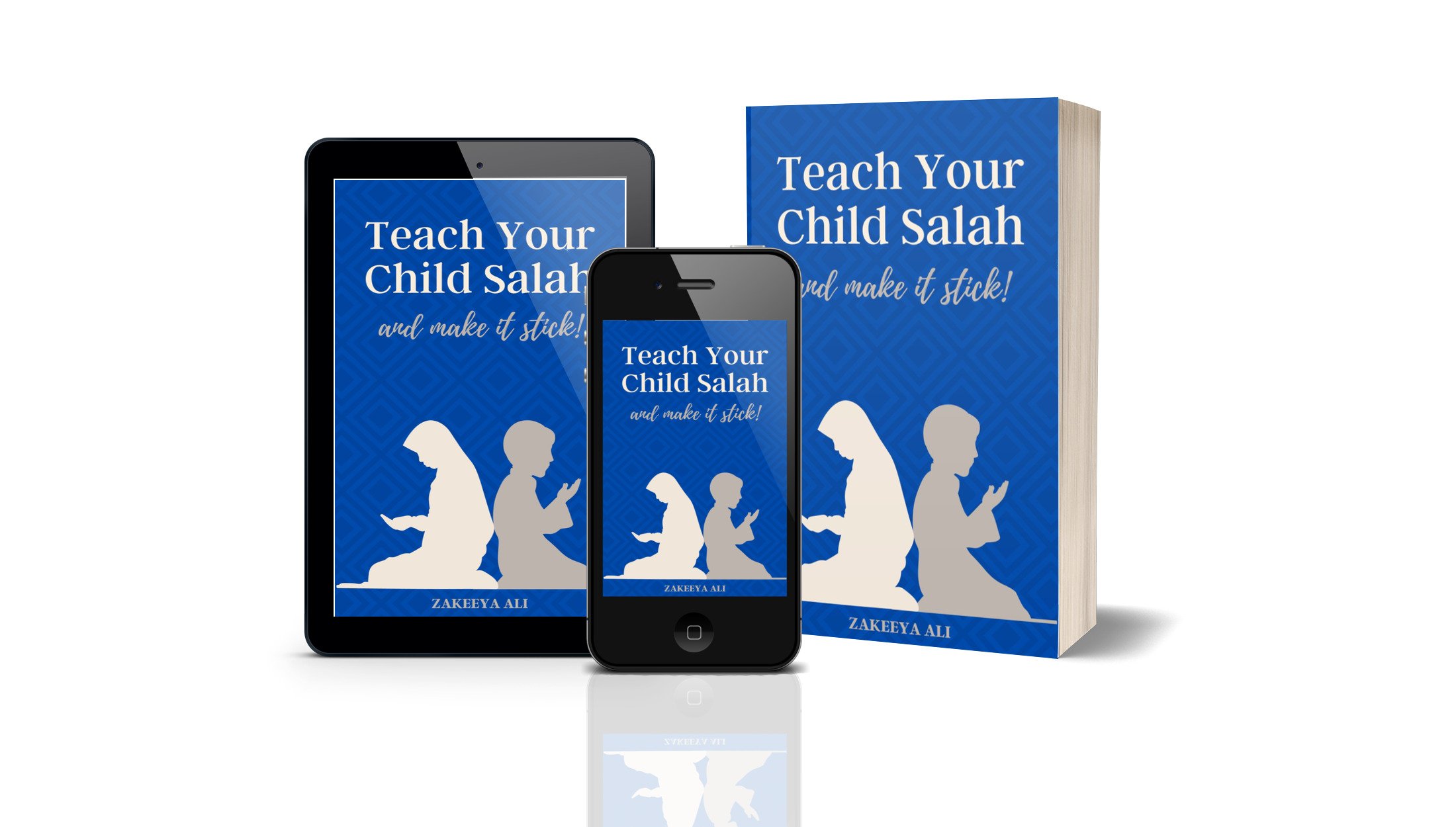5 Ways To Teach Your Child Salah With Love
For some of us parents, when our first child turns seven, we become anxious and stressed-out, thinking about how we will teach our child salah with love and understanding. On top of this, how will we instruct them to pray positively and in a welcoming way, so our child remains consistent into adulthood?
The answer is to prepare and set a plan of action before teaching salah to your child. There are many ways to lead your child in salah, and I cover them in detail in my book. However, I will share 5 of them that have been very effective with my kids in helping to make the task easier.
These tips can be used for kids of any age, so whether you are starting to teach your child as a young child or as a teen, they should apply. Of course, it may be more challenging the later you teach your child salah, and that's why I always advise parents to follow the Islamic recommended time frame to teach salah. Either way, don't lose hope; begin with intention, dua, and purpose, as that's the first step to succeeding in anything.
1. Make Salah a Priority as a Parent
When I think back to my childhood and the implications of seeing my parents be steadfast in their salah, I realize what an impact it had on me as an adult. Even though my parents did not force me to pray every salah, my dad would remind us, and he urged us to join him in jamaat for maghrib. I witnessed my parents perform all their salah except for fajr, and that's why I feel it was the hardest prayer for me to implement when I became a regular.
The example you set as a parent is crucial because your child is watching and absorbing your actions more than your words. Even though your children may seem like they're not following your example, they're noting it, and it will be in the memory banks as adults. I speak from experience and from many others I've asked.
Therefore, try to make salah a significant priority in your household and show your child how you rotate your life around your prayers, and not rotate your prayers around your life! It's also a great way to schedule your day. When you go outside, let your children see that no matter where you are, salah is never intentionally missed.
I will usually pull over somewhere I am comfortable to pray, or I will tell my children beforehand that we should go out between prayer times, so we don't miss any of them. A good example would be when we go for a movie, and I will not choose movie times that may cause us to miss a salah. I make it a big no-no, out-of-the-question kind of vibe.
When we are out, I will also say statements like, "Subhanallah, we should leave here before we miss asr." "Can you help me find a good spot to pray?" "Do you think we will be back in time for maghrib?" Those words are profound as it brings awareness to your child on what you consider important and your willingness to stop what you're doing to pray.
Using a Salah Journal is a great help!
2. Display Positivity and A Good Attitude Towards Salah
As a parent, you have to ensure that your attitude towards salah is correct first. Reflect on how you view salah and if you have a warm and positive feeling towards it. In this way, you'll be able to portray a friendly and positive sentiment towards salah for your kids. What helps me a lot is to start my morning on the right foot. I find my peace and solitude first by getting up early and making tahajjud and dua, as this is priceless for getting me in a positive frame of mind before I have to deal with my day.
I usually will wake my children up for fajr by gently reminding them about salah time. I make it a habit to call them every day, continually, and I do not take this as frustrating or a chore. I tell myself that this is my way of gaining barakah and sawaab. Also, children do not know what's right for them, so it is my duty as a parent to be that reminding factor.
Definitely don't yell at your kids or bang on their door with a loud tone, saying something like, "Get up; you have to pray, or you'll get punished!" Instead, I calmly say things like, "Assalamu alaikum, good morning, honey; time to wake up for fajr. Don't miss it; there's so much barakah and reward waiting for you! Hurry, the sun is rising, my son (or daughter)."
Regarding some of my stubborn teens, I will also remind them of some Hadith that speak on what they will miss as sleepers who miss fajr—that's a great motivator! Other times I will play a Quran recitation to remind them and make them feel guilty for sleeping in. Do what you need to do to wake your kids up, especially if they are of the age of accountability; just don't do it harshly or with insult and anger, as you want their memories of salah to be positive.
3. Instill Stories When Teaching Salah
For younger kids, especially, stories are an innovative way to teach them about their deen. Prophet Yaqub A.S. used to tell his sons beautiful and descriptive accounts of enlightenment. Many of us may not have had this wonderful gift from our parents, so we may not understand its impact on children. But it is impactful, and again, I speak from my childhood experience.
Looking back, I remember my father reading my sister and me Islamic stories most bedtimes when I was in elementary school. We would listen to my dad read the same stories repeatedly because we only had a few books, though we would never tire of hearing them.
To this day, it is one of my most treasured memories of my childhood, and I love my dad for taking the time to read to me; plus, I learned so much from those stories! When I became a parent, I ensured that I got a copy of every one of those books for my kids plus more, so you see the impact of stories?
One of the worst storytelling you can tell your young child is what will happen to them if they do not pray. As a child, I was taught by some of my Islamic studies teachers about the punishment of the grave when we don't do something. This was very scary as a child and never made me want to run to pray; instead, I just feared Allah more.
You do not want your child to connect prayer with punishment when you first begin salah instruction. Instead, describe your kids the immense love that Allah SWT has for them and how much we want to thank Him for all we have. However, I'm a firm believer in warning teens about the repercussions of missing their salah and teaching them the deen with a balance of hope and fear as the scholars recommend.
You do not want to make missing salah something easygoing for teens, as they will use that to their advantage. Instead, remind them nicely, and if they keep missing their prayers, have a talk with them and read Quranic verses and Hadith on the consequences. It is their right to know at an older age, and we shouldn't be doing our kids a disservice by not giving them the full picture.
To give you an idea of the kind of stories you can tell your kids about salah, I will share one of my stories with you that I've told my children.
My dear (name of your child), as you know, we are supposed to pray five times salah at specified times each day. We have been given the gift of salah to help us during the day to unwind and reflect on our Creator and our purpose in life. If we did not have salah, we would get so wrapped up in our routines and busyness.
Salah not only helps us connect to God, but it is also a break to catch our breath and think about our actions. It safeguards us from the waswaa (whisperings) of shaytaan and serves as our coat of armor. Also, our wudhu before salah helps to wash away the sins since our last ablution, and thus, we are cleansed each time, not only physically but also spiritually. Together with salah, we will feel re-energized and ready to tackle anything ahead!
See what a gift we were given, my child? It's an opportunity to speak to Allah one-on-one in a private moment to share our troubles, our joys, our gratitude, our dreams, our hopes, and our aspirations. As you turn to Him, you will feel so much relief, and the barakah will pour into your life as you gain the pleasure of your Lord. So no matter where you are, my dear, or what you are doing, always make salah a priority and never let it go, as you will surely feel lost and alone.
4. Be Patient and Gentle With The Outcome
Yes, there are rules for performing salah, and you need to teach your children the fiqh of salah over time. Just start with the essential rules and add more slowly as they handle the previous steps. You do not want to overwhelm your kids and say things like, "You need to have wudhu first!" "Put your hands there!" "Touch your nose and forehead to the ground for your sujood!" etc., etc.
Have compassion for your little ones and teach them with patience and understanding as you consider their age, and especially when teaching salah to them for the first time. Focus more on Who are we praying to? Why do we pray to Allah? What's the reward for praying to Him? Make your child understand how salah impacts our lives as humans and the blessings it can bring us.
Some ways to motivate a child is to let them lead a salah, say the adhan, help set out prayer mats and garments, or gather everyone for prayer in jamaat. Encourage your children to also pray together for more reward or make your prayer in front of them and ask them to join you. You may need to make it a priority to pray a few of your salah with your child. Then, as I do, pray fajr and isha on your own with more khushoo.
Stick to your outcome! Remember that you want your child to formulate salah into a habit. To know that he/she can turn to salah for solace, thus causing a more profound desire to pray. You want your child to understand that salah is an obligation, not a choice, so it is a vital part of being a believer and having faith.
5. Express Praise and Make Dua For Your Child
Salah times are the moments you want to praise your child and hand out treats for accomplishments. I know some parents who frown at giving rewards for making salah, as they see it will be expected, and their kids won't pray for the right reasons. I disagree and say to those parents, "How can it be wrong if Allah SWT rewards us for our good deeds all the time?" He created us, so He knows how we think and what motivates us more than ourselves.
You can say words of praise to your kids, such as, "Mashallah, my son/daughter, I am so proud of your efforts to perform your salah on time." "Wow, you really learned fast how to make wudhu properly; Allah loves that you're so dedicated, my child." "May Allah reward you immensely habibi/habibtee, and may He fill your face with noor, ameen." "Alhumdulillah, you are surely maturing because you realize the importance of remembering and praising your Lord; may He always guide you to that which is pleasing to Him, ameen." Hugging and kissing your child is another encouraging way to show your love and approval when he/she performs their salah.
There were days when I was a less inexperienced parent, and I would nag my children to pray and criticize them when they didn't dress appropriately or slack in their prayer movements. Sometimes they would giggle or come late, and I'd give them a lecture or take some privilege away. I thought I needed to do this as it was my duty as a parent to instill prayer in my kids' lives correctly. But my heart knew this might be doing more harm than good, so I become more gentle at salah times.
If you have made errors like these, know that you can fix them today; it's never too late to change your attitude. Children are resilient alhumdulillah, so you can apologize to them for your error, explain why it was not the right way to instruct, and begin to teach them with the love and understanding discussed in this post.
Implementing These 5 Tactics Should Reap Results
I pray these five ways to teach your child salah with love will cause improvement and positive feelings with your kids' prayer attitude. I find these methods have been effective with my children and my friends' children who tried them.
Most of my kids are teens now, yet I still need to remind them not to miss their salah every day. However, I do feel I have succeeded in instilling salah as a significant part of our lives alhumdulillah, and that's a big step in itself. Each child is different, of course, and your circumstance matters too, so please consider that when you try these tips and tweak where necessary.
Salam, I’m Zakeeya!
I believe that making our homes a safe haven for our families, as well as being a wife and mother, brings us great blessings, contentment, and benefits to society as a whole. Since 2011, I've been dedicated to assisting Muslimas in finding tranquility in their roles, taking better care of themselves, and achieving inner peace. Our journey in this world is not an easy one, but I pray the tools and guidance I offer will help you face life's challenges with more gratitude and mindfulness. Join me as I share wifehood, motherhood, homemaking, and lifestyle solutions that make life more fulfilling for you as a woman! Read more about me here.
Need More Help In Teaching Your Kids Salah With Love?
Purchase the, Teach Your Child Salah and Make It Stick book. It has been written over the years after I gathered the information from my own trial and error with my children and from helping others. Now you too can benefit from my experience in learning the art of getting your child to develop a love of salah so it sticks!


























